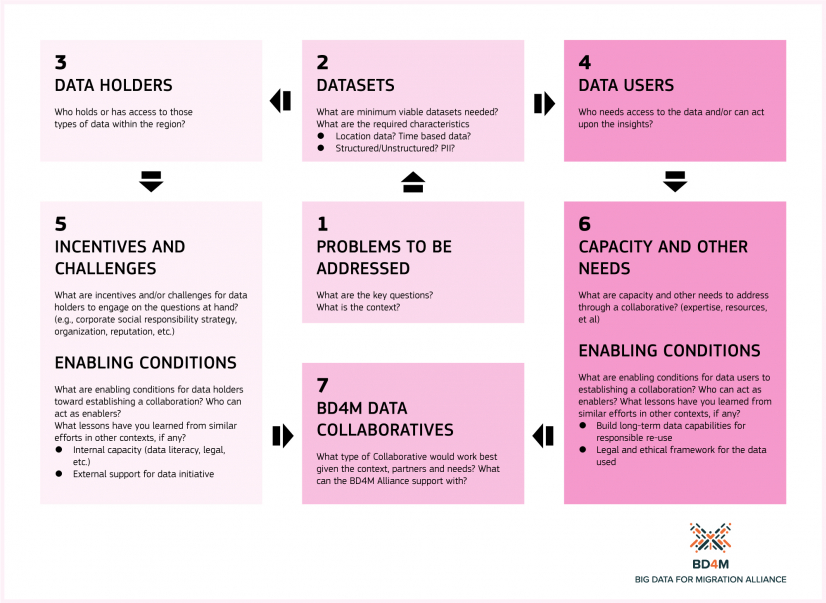Today, the Big Data for Migration Alliance (BD4M) is releasing the report, “Designing Data Collaboratives to Better Understand Human Mobility and Migration in West Africa,” providing findings from a first-of-its-kind rapid co-design and prototyping workshop, or “Studio.” The first BD4M Studio convened over 40 stakeholders in government, international organizations, research, civil society, and the public sector to develop concrete strategies for initiating and implementing cross- sectoral data partnerships, or “data collaboratives,” to facilitate ethical and secure access to data for migration-related policymaking and research in West Africa.
BD4M is an effort spearheaded by the International Organization for Migration’s Global Migration Data Analysis Centre (IOM GMDAC), European Commission’s Joint Research Centre (JRC), and The GovLab to accelerate the responsible and ethical use of novel data sources and methodologies—such as social media, mobile phone data, satellite imagery, artificial intelligence—to support migration-related programming and policy on the global, national, and local levels.
The BD4M Studio was informed by the The Migration Domain of The 100 Questions Initiative — a global agenda-setting exercise to define the most impactful questions related to migration that could be answered through data collaboration. Inspired by the outputs of The 100 Questions, Studio participants designed data collaboratives that could produce answers to three key questions:
- How can new data sources be used to estimate current cross-border migration and mobility by sex and age in West Africa?
- How can new data sources be used to assess the current state of diaspora communities and their migration behavior in the region?
- How can we use non-traditional data to better understand the drivers of migration in West Africa?
As part of the co-design exercise, participants used the BD4M Canvas, a tool to enable the rapid design of data collaboratives that are problem-driven, effectively match data holders and data users working in the public interest, and take into account key incentives, challenges, and enablers that can help to unlock the value of big data for migration.
The first BD4M Studio Report released today shares the strategies developed by participants, as well as several key takeaways they deemed important for the systematic, sustainable, and responsible re-use of data to create positive outcomes in the field of migration — in West Africa and more broadly:
- Establishing a Common Vocabulary: Multi-stakeholder collaborations are often ineffective in the absence of a common vocabulary. Upfront consensus-building and sense-making efforts regarding foundational concepts and questions (e.g., what qualifies as a migratory movement?) will be critical for effective and legitimate collaboration among parties as diverse as multinational data-holding corporations, international development institutions, national governments and community-based organizations serving migrants’ needs.
- Building the Technical, Financial, and Legal Capacity of Local Stakeholders: Local community- based organizations are key partners in data collaboration and reuse efforts, but they often lack the technical, financial, and legal capacity of larger international players. To maximize the value of big data for migration initiatives, international organizations and funders could support community-based organizations in the region by investing in capacity building and further engaging them as key partners in their work.
- Defining Business Models: Some private sector actors participate in public-interest data collaboratives on a pro bono basis, while others have established new models for selling or licensing aggregated datasets or layers to public-interest institutions. An expanded inquiry into the potential business case for data collaboration across different regions and industries could provide clear and compelling reasons for participation.
- Developing a Sustainability Strategy: Stakeholders need to ensure the operational and financial stability of their data collaboratives over time. This can involve using new funding streams, building human infrastructure by codifying data stewardship roles and responsibilities, and proactively planning for downstream expansion or replication of promising pilots.
- Clarifying Jurisdictional Implications: By definition, migration data collaboratives face challenging cross- border information flows and fragmented data protection and regulatory regimes. Stakeholders should proactively assess commonalities and differences between data policies and regulations in different jurisdictions for the creation of contracts, data-sharing agreements, and other legal instruments that can enable data collaboration across sectors and borders.
- Developing an Ethical Framework: Stakeholders should establish an ethical framework addressing critical challenges related to cross-sectoral data partnerships, including managing group privacy risks, ensuring data representativeness, and developing the technical and legal foundations for the implementation of privacy- preserving technologies for data collaboration.
Read the full report here.
To learn more about BD4M and explore partnership, visit data4migration.org.





